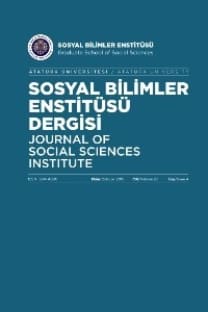Covid-19 Pandemisi Sürecinde Uzaktan Eğitim Sürecinin Öğrenci Perspektifinden Değerlendirilmesi
Evaluation of Distance Learning from Student Perspective in Covid-19 Pandemic
___
- Akpınar, F., & Ustun, Y. (2020). “Kadın hastalıkları ve doğum pratiğinde SARS-COV2 (COVID-19) enfeksiyonu ile ilgili güncel bilgiler”. Türk Kadın Sağlığı ve Neonatoloji Dergisi, 2(1), 13-16.
- Anadolu Agency. (2020, March 12). Turkey to air remote school lessons amid COVID19 fears. https://www.aa.com.tr/en/latest-on-coronavirus-outbreak/turkey-to-airremote-school-lessons-amid-covid-19-fears/1764165#
- Basilaia, G., & Kvavadze, D. (2020). “Transition to Online Education in Schools during a SARS-CoV-2 Coronavirus (COVID-19) Pandemic in Georgia”. Pedagogical Research, 5(4), 1-9.
- Demuyakor, J. (2020). “Coronavirus (COVID-19) and Online Learning in Higher Institutions of Education: A Survey of the Perceptions of Ghanaian International Students in China”. Online Journal of Communication and Media Technologies, 10(3), e202018.
- Dwivedi, D., Kaur, N., Shukla, S., Gandhi, A., & Tripathi, S. (2020). “Perception of stress among medical undergraduate during coronavirus disease-19 pandemic on exposure to online teaching”. National Journal of Physiology, Pharmacy and Pharmacology, 10(8), 1-6
- Hahn, G., Lee, S., Weiss, S., & Lange, C. (2020). “Unsupervised cluster analysis of SARS-CoV2 genomes reflects its geographic progression and identifies distinct genetic subgro ups of SARS-CoV-2 virus”. bioRxiv.
- Karadağ, E., & Yücel, C. (2020). “Yeni Tip Koronavirüs Pandemisi Döneminde Üniversitelerde Uzaktan Eğitim: Lisans Öğrencileri Kapsamında Bir Değerlendirme Çalışması”. Yükseköğretim Dergisi, doi:10.2399/yod.20.730688
- Kürtüncü, M., & Aylin, K. (2020). “Covid-19 pandemisi döneminde hemşirelik öğrencilerinin uzaktan eğitim konusunda yaşadıkları sorunlar”. Avrasya Sosyal ve Ekonomi Araştırmaları Dergisi, 7(5), 66-77.
- Lall, S., & Singh, N. (2020). “CoVid-19: Unmasking the new face of Education.” International Journal of Research in Pharmaceutical Sciences, 11(SPL1), 48-53.
- Mahdy, M. (2020). “The Impact of COVID-19 Pandemic on the Academic Performance of Veterinary Medical Students.” doi: 10.20944/preprints202006.0130.v1
- Nenko, Y., Кybalna, N., & Snisarenko, Y. (2020). “The COVID-19 Distance Learning: Insight from Ukrainian students”. Revista Brasileira de Educação do Campo, 5, e8925-e8925.
- Nguyen, T., & Huynh, N. (2020). Impact of the COVID-19 Pandemic Outbreak on the Learning Process. Unpublished thesis, Lapland University of Applied Sciences, Rovaniemi, Finland.
- Owusu-Fordjour, C., Koomson, C. K., & Hanson, D. (2020). “The impact of Covid-19 on learning-the perspective of the Ghanaian student”. European Journal of Education Studies, 7(3), 88-101
- Muthuprasad T., Aiswarya S., Aditya K. S. & Girish K. Jha. (2020). “Students’ Perception and Preference for Online Education in India During COVID -19 Pandemic.” SSHO-D-20-00289. Available at SSRN: https://ssrn.com/abstract=3596056 or http://dx.doi.org/10.2139/ssrn.3596056
- T.C. Sağlık Bakanlığı, Halk Sağlığı Genel Müdürlüğü, COVID-19 (SARS-CoV-2 Enfeksiyonu) Rehberi (Bilim Kurulu Çalışması) (2020). T.C. Sağlık Bakanlığı.
- T.C. Sağlık Bakanlığı. (2020). Türkiye'deki Güncel Durum. https://covid19.saglik.gov.tr/Yamamoto, G. T., & Altun, D. (2020). “Coronavirüs ve çevrimiçi (online) eğitimin önlenemeyen yükselişi”. Üniversite Araştırmaları Dergisi, 3(1), 25-34.
- The jamovi project (2019). jamovi. (Version 1.1) [Computer Software]. https://www.jamovi.org.
- WHO. (2010, February 24). What is a pandemic?. https://www.who.int/csr/disease/swineflu/frequently_asked_questions/pandemic/en/
- WHO. (2020, March 11). Coronavirus disease 2019 (COVID-19) Situation Report – 51. https://www.who.int/docs/default-source/coronaviruse/situation-reports/20200311- sitrep-51-covid-19.pdf?sfvrsn=1ba62e57_10
- YÖK. (2020, May 11). Yök'ten Üniversitelerdeki Sınavların Yüz Yüze Gerçekleştirilmeyeceğine İlişkin Karar. https://www.yok.gov.tr/Sayfalar/Haberler/2020/yok-ten-sinavlara-iliskin-karar.aspx
- YÖK. (n.d). COVID-19 Yükseköğretim Yol Haritası. https://covid19.yok.gov.tr/Documents/AnaSayfa/covid-19-yuksekogretim-yolharitasi.pdf
- ISSN: 1304-4990
- Yayın Aralığı: 4
- Yayıncı: Atatürk Üniversitesi Sosyal Bilimler Enstitüsü Müdürlüğü
“Örgütsel Atalet Ölçeği” nin Türkçeye Uyarlanması, Geçerlik ve Güvenirlik Çalışması
Kenan ORÇANLI, Mustafa BEKMEZCİ, Z. Mehmet FIRAT
Çok Kriterli Karar Verme Yöntemleriyle Kitlesel Açık Çevrimiçi Kursların Seçim Süreci
Güler KARAMAN, Özge TUNCER, Esra ÖZMEN
Çimento Fabrikası Üretim Hattının Simülasyonla İncelenmesi
Vecihi YİĞİT, Pınar Münevver ASLAN
Televizyon Yayıncılığında Büyük Veri
Erzurum’daki Hastanelerin Sağlık Turizmi Açısından Değerlendirilmesi
Türkiye’de Hanehalkı Ve Konut Büyüklüklerinin, Doğalgaz Tüketimi Kapsamında Değerlendirilmesi
Gökalp Nuri SELÇUK, Serkan PASİNLİOĞLU
David Hare’in Bakış Açısıyla İsrail-Filistin Çatışması: Via Dolorosa
Türkiye’deki Hayat-dışı Sigorta Şirketlerinin Karlılığının Belirleyicileri
Erhan ÇANKAL, Abdurrahman ÖZEN
Akademisyenlerin Kovid-19 Algısı
Örgütsel Atalet Ölçeğinin Türkçeye Uyarlanması, Geçerlik ve Güvenirlik Çalışması
